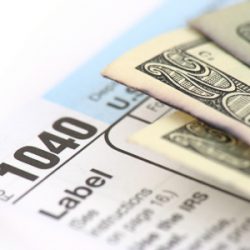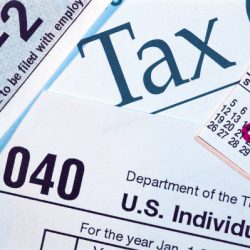In 2007, Congress enacted the Mortgage Forgiveness Debt Relief Act in 2007 — legislation that exempted from personal income taxes the portion of mortgage-related debts that were forgiven by lenders in the aftermath of the financial crisis.
Under the Internal Revenue Code, when the repayment of some or all of a loan obligation is waived — such as in the case of a mortgage cancellation, short sale or some other type of modification that reduces the unpaid balance of a loan — the IRS views the forgone amount the same as if it were paid as ordinary income, and it is fully taxable to the recipient. Congress saw fit to shield borrowers against ...
Read More...
Bankruptcy Filings Are Down – But That Doesn’t Mean People Do Not Need to File
Reuters reported today that the number of U.S. businesses and consumers filing for bankruptcy fell 14 percent in the first half of 2012 and could end the year at the lowest level since before the 2008 financial crisis, according to data released by Epiq Systems.
New bankruptcy filings fell to 632,130 in the first six months of the year compared to the same period last year, according to Epiq Systems Inc, which manages documents and claims for companies in bankruptcy.
The number of businesses filing for bankruptcy dropped 22 percent to 30,946 and the number of consumers seeking court protection from creditors fell 13 percent to 601,184.
"We ...
Read More...
Do You Want Bank of America As Your Landlord?
Bank of America has announced that it is rolling out a test program in three states (including New York) in which the bank will accept a deed-in-lieu of foreclosure from homeowners in foreclosure and then rent the properties back to the homeowners for an unspecified period of time.
For those homeowners who have tried to modify, have been unable to do so, and remain too stubborn to file for bankruptcy, this may be an option - but it may come with strings attached.
First, BOA has not discussed anything about the tax consequences of the transaction. Even if a homeowner “surrenders” a property bank to a lender, the lender still has the right ...
Read More...
Tax Refunds and Chapter 7 Bankruptcy – Nothing Has Changed For Homeowners With Equity
In bankruptcy, you are allowed to protect various assets, such as cash or cash equivalent assets such as the right to receive a tax refund. This is called exempt property or exemptions.
When the exemption laws were overhauled in New York in January 2011, it proved to be a major benefit to homeowners and renters alike. Homeowners are now allowed to protect up to $150,000.00 in equity in their primary residence. Renters are now allowed to protect up to approximately $12,000.00 in any personal property, including tax refunds.
Despite the above benefits, there has always been, and still remains, a tradeoff for homeowners. If a homeowner ...
Read More...
New Means Test Housing Allowances Levels Playing Field for Long Island Renters
Most individuals or couples filing for protection under either Chapter 7 Bankruptcy or Chapter 13 Bankruptcy are required to meet certain income eligibility requirements under the “Means Test.”
Under the Means Test, you must first determine if your average monthly income for the last six months is below the median income for your state, based upon the size of your household.
If your average monthly income for the past six months is below the median income in New York, you have passed the first hurdle, and so long as you meet the other eligibility requirements, you can file for protection under Chapter 7 Bankruptcy.
If your average monthly ...
Read More...
It May Make Sense to Get Over It – Mr. Obama Is Not Going To Save Your Home…
Earlier today, I was listening to a business report on the radio in which an economist actually recommended that homeowners who purchased a home in the mid-2000's with little or no money down, who are now at least 12 months behind on their mortgage and have been unable to modify their mortgage because of insufficient income, actually file for Chapter 7 bankruptcy and GET IT OVER WITH - MR. OBAMA IS NOT GOING TO SAVE YOUR HOME!!!
Unfortunately, this mantra is going to going to get louder in the coming months as (a) banks may have already modified the vast majority of those who can truly afford to make timely mortgage payments, and (b) State ...
Read More...
Are Mortgage Lenders Encouraging Homeowners to File Bankruptcy?
I know this sounds completely bizarre, but it may start happening more frequently in the near future.
In the past 30 days, I have encountered three new clients who have been "informally" advised by their mortgage lenders to file bankruptcy to deal with their unsecured debt PRIOR to completing a mortgage modification.
Lenders, in addition to the 31% rule (previously discussed in another post), are now taking a closer look at a homeowner’s total debt ratio - also known in the banking business as the “back end number.”.
In the cases I have encountered thus far, each client had a total debt ratio (mortgage payments, auto payments and credit ...
Read More...
Parent Guarantees of Student Loans – Love Your Children, But Don’t Sign For Them!
In the recent past, I have seen a trend develop that, even as a parent, I find extremely disturbing - parents seeking bankruptcy protection in mid-life or in preparation for retirement that will remain saddled with their children’s student loan obligations long after they have discharged of their other debts.
Here’s an example: A couple in their early-mid 50's that rent an apartment, with a combined income of in excess of $80,000 per year has $50,000 in credit card debt. In addition, while their child was in college, they co-signed for an additional $50,000 in student loans. Their child, now is his/her late 20's, is having difficulty ...
Read More...
How the New York Exemptions Increases Will Effect Your Tax Refund in a Bankruptcy
Effective January 22, 2011, New Yorkers filing for bankruptcy will have the added benefit of higher bankruptcy exemptions. The major change is thanks to Governor David Patterson, who signed the bill into law (his last while in office) just before Christmas last year.
Exemptions are the legislative tools that a debtor uses to protect their property when they file for bankruptcy. The purpose of exemptions is to assure that debtors are able to continue living a productive economic life. If a debtor loses all of their belongings when they file bankruptcy, they will have a more difficult time getting back on their feet. The more property that ...
Read More...
Eliminating Taxes: What Taxes are Dischargeable in Bankruptcy?
It is commonly misunderstood that bankruptcy cannot eliminate any tax liability. Although treatment of tax liability is one of the most complex aspects of consumer bankruptcy law, the Bankruptcy Code does offer many debtors substantial income tax relief. Whether or not your bankruptcy filing relieves your tax debt depends on several factors including the nature and the status of tax liability and the type of bankruptcy proceeding. Remember, only individuals can discharge certain tax debts, not businesses.
An individual can discharge debts for taxes in Chapter 7 bankruptcy only if all of the following conditions are true:
They are only ...
Read More...


 What Makes Me Different From the Others?
What Makes Me Different From the Others?